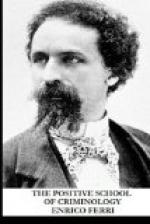On the other hand, nothing is created and nothing destroyed either in matter or in force, because both matter and force are eternal and indestructible. They transform themselves in the most diversified manner, but not an atom is added or taken away, not one vibration more or less takes place. And so if is the force of external and internal circumstances which determines the decision of our will at any given moment. The idea of a free will, however, is a denial of the law of cause and effect, both in the field of philosophy and theology. Saint Augustine and Martin Luther furnish irrefutable theological arguments for the denial of a free will. The omnipotence of God is irreconcilable with the idea of free will. If everything that happens does so because a superhuman and omnipotent power wants it (Not a single leaf falls to the ground without the will of God), how can a son murder his father without the permission and will of God? For this reason Saint Augustine and Martin Luther have written de servo arbitrio.
But since theological arguments serve only those who believe in the concept of a god, which is not given to us by science, we take recourse to the laws which we observe in force and matter, and to the law of causality. If modern science has discovered the universal link which connects all phenomena through cause and effect, which shows that every phenomenon is the result of causes which have preceded it; if this is the law of causality, which is at the very bottom of modern scientific thought, then it is evident that the admission of free thought is equivalent to an overthrow of this law, according to which every effect is proportionate to its cause. In that case, this law, which reigns supreme in the entire universe, would dissolve itself into naught at the feet of the human being, who would create effects with his free will not corresponding to their causes! It was all right to think so at a time when people had an entirely different idea of human beings. But the work of modern science, and its effect on practical life, has resulted in tracing the relations of each one of us with the world and with our fellow beings. And the influence of science may be seen in the elimination of great illusions which in former centuries swayed this or that part of civilized humanity. The scientific thought of Copernicus and Galilei did away with the illusions which led people to believe that the earth was the center of the universe and of creation.




